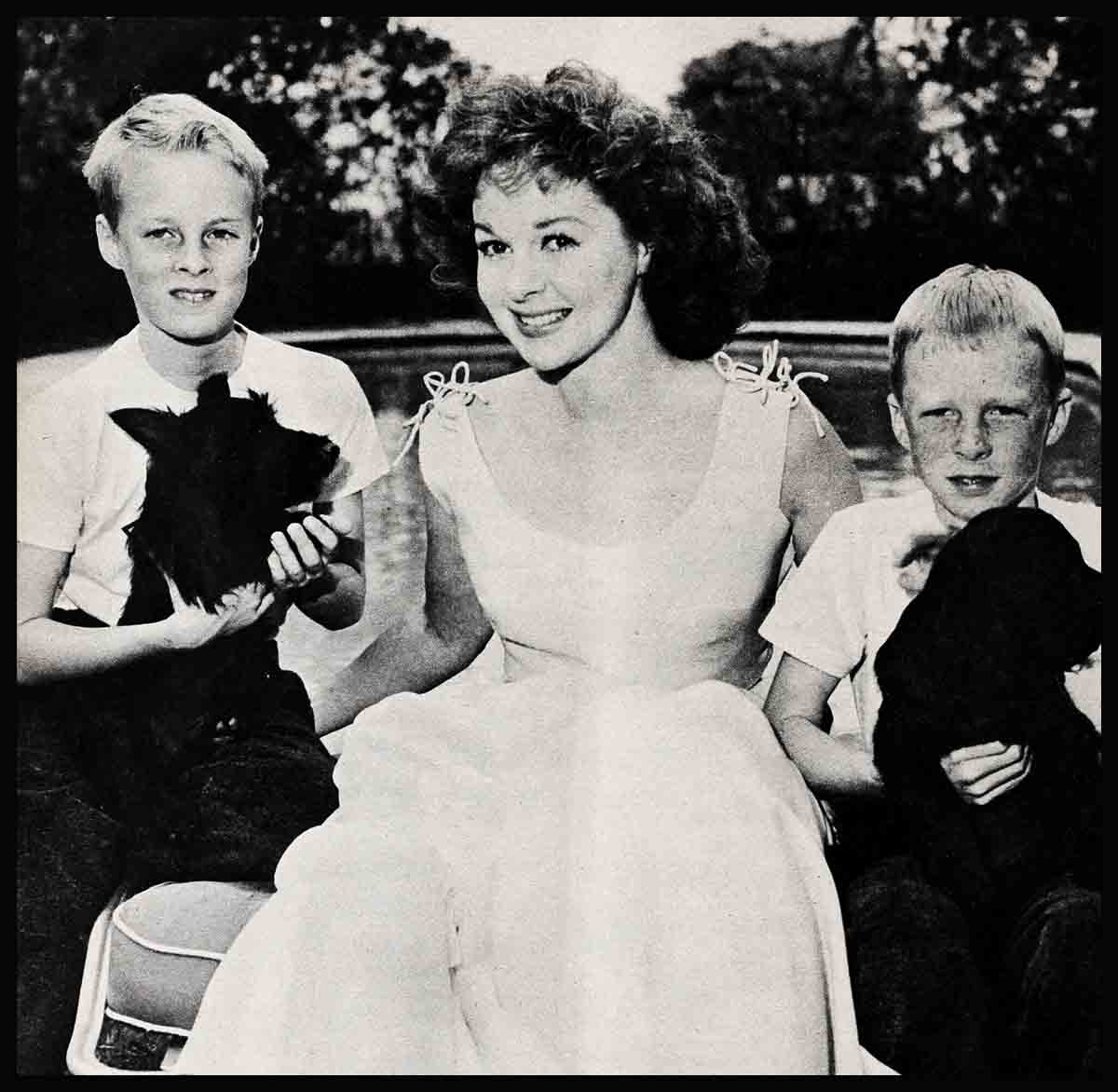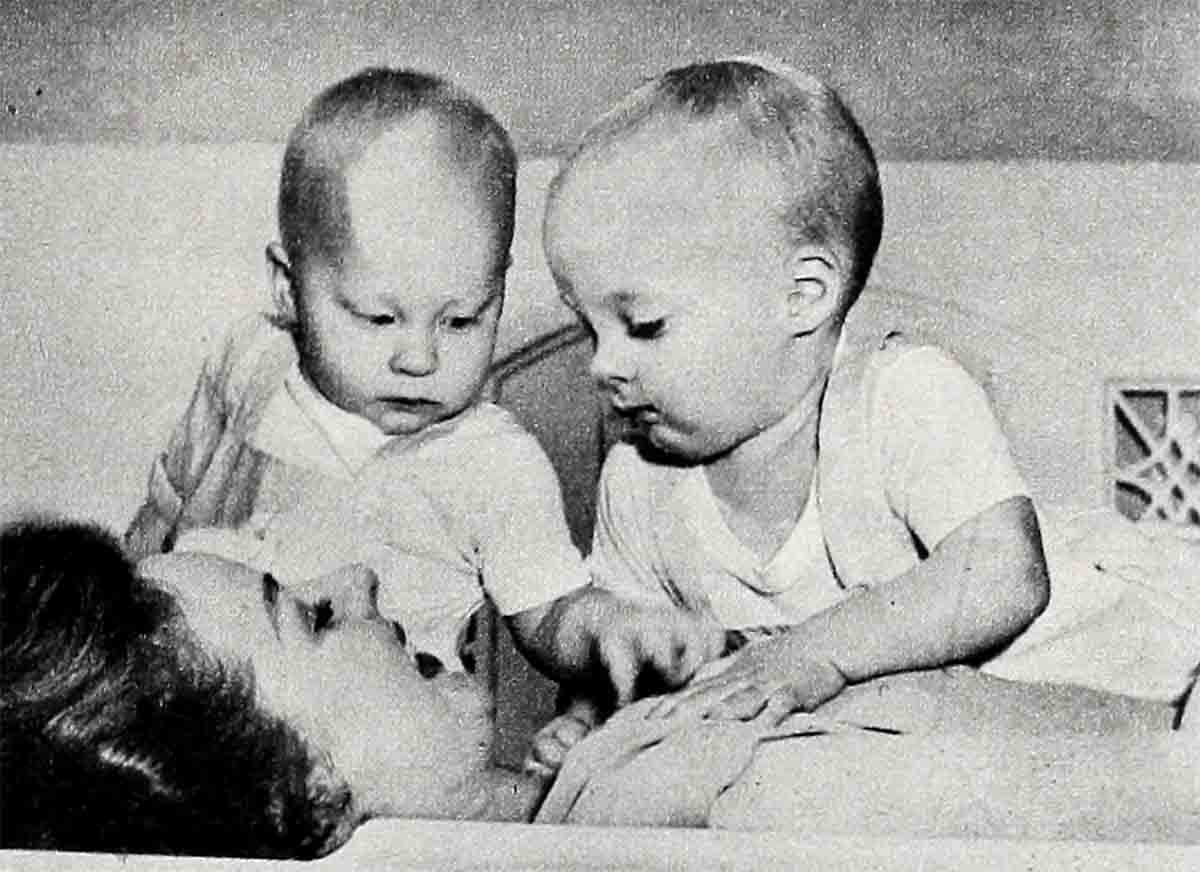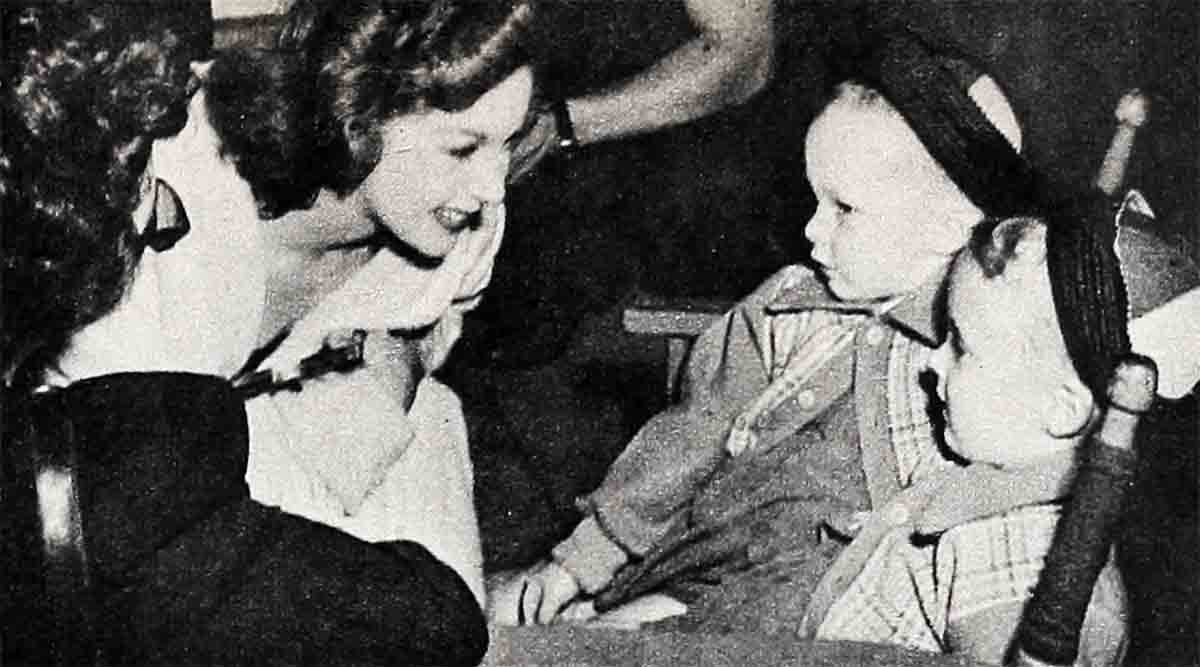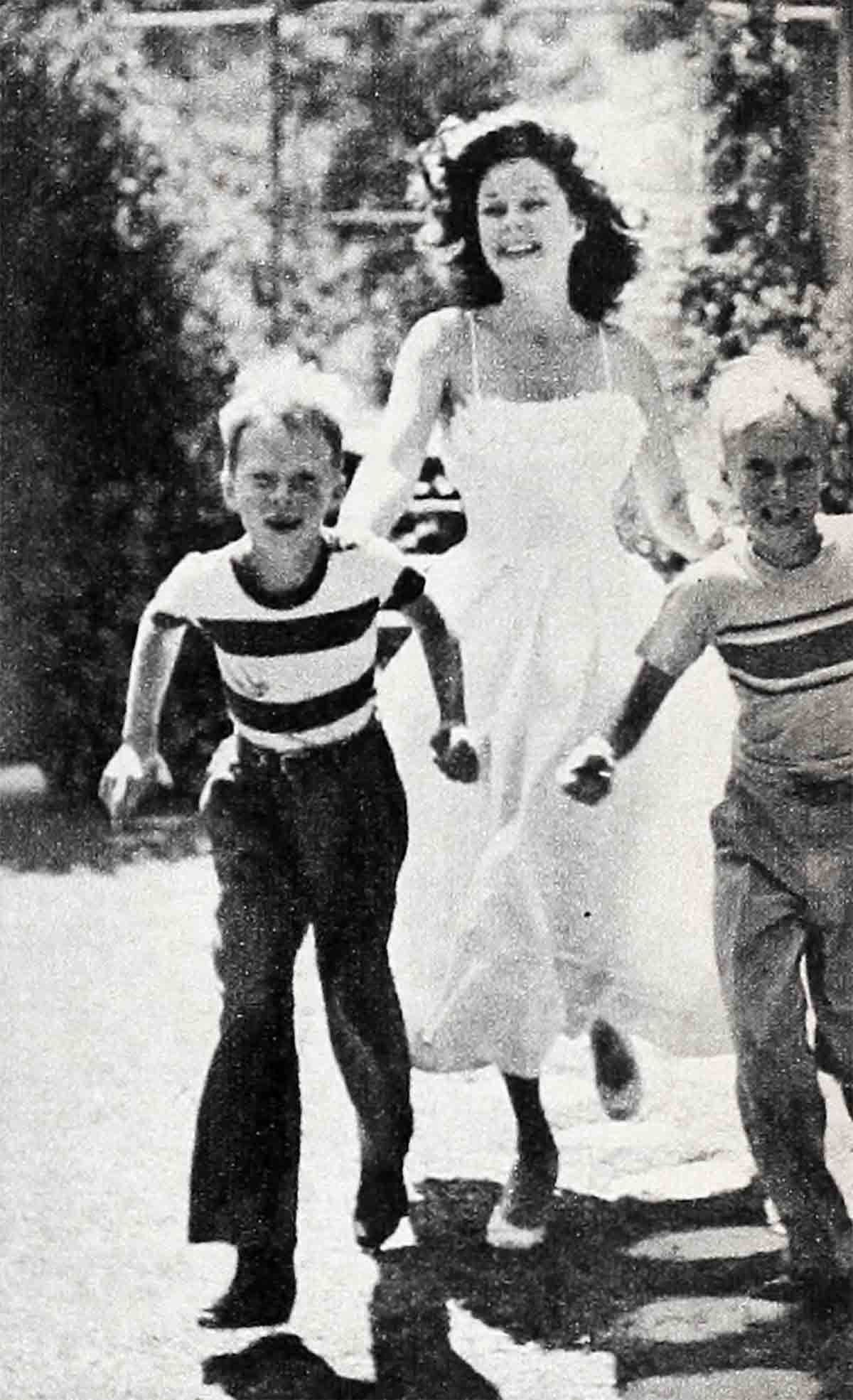
Mom’s No Quitter!—Susan Hayward
This is a Friday night at the home of Susan Hayward. Dinner is over; the hands of the clock are creeping towards seven and red-haired, freckle-faced Greg, already dressed in his Cub Scout uniform, goes to the foot of the stairs and yells up to his twin brother, Timmy.
“Hey, Tim, aren’t you ready yet? You’ll make us late for the meeting. Come on, Mommy and I are waiting.”
“Aw, hold your horses—hold your horses,” Timmy yells back, and eventually he comes ambling down the stairs from the big second floor room he shares with his brother.
There’s a last-minute tapping of pockets to make sure they have everything and then the two boys are ready to pile into the car with their mother and set off for the weekly meeting of their Cub pack. But there’s one thing more.
“Jackets, men,” says Susan. “It’s a little cool outside.”
“Aw, Mom,” the twins protest in unison, “we don’t need jackets. We’ll be warm.”
“Jackets, please, and no arguments,” Susan insists, smiling but firm. “See, I’m wearing a coat. And tell Cleo (Cleo is the housekeeper) good night.”
So the black Cadillac convertible heads out the driveway and the ‘three of them—Susan and her lively and full-of-mischief twins are off for another happy Friday, one of many since the little Barker Brothers became Cubs and Susan joined the neighborhood Den Mothers.
“It’s been a wonderful experience for all of us,” Susan says. “At first, when I started coming with the boys to the Cub meetings, the other parents were a little shy and unsure of me. But then we all started warming up and before long we were making and sharing the lemonade, comparing the exploits—and the mischief—of our offspring and having a really fine time.”
Close as Susan has always been to her twins, she is even closer now since her separation from Jess Barker. Jess, of course, takes the boys out one night a week and has them on alternate weekends; Susan wouldn’t have it any other way. “I don’t want Timmy and Greg hurt by our problems,” says Susan. “They need love now more than ever.”

So the weekends Susan has with the twins are devoted to barbecues and cookouts in the back yard, exuberant swimming parties around the pool with a bunch of the neighborhood kids invited over, or fun-packed trips to nearby vacation spots. There was the Saturday and Sunday Susan and her boys spent at the nearby Long Beach amusement park—a miniature Coney Island; garish, noisy and crowded, echoing with the strident call of the barker’s, “Three balls for a. dime!”; the heady aroma of broiling hot dogs, cotton candy and potato chips; the enticements of roller coaster, merry-go-round and mirrored Crazy House. Greg and Timmy were in a high state of excitement debating the rival merits of the chute-the-chute against the Space Ship ride—and just as excited was their red-haired mother, a tomboy at heart.
“What an outing!” laughed Susan. “By the time it was over I was limp, and the boys fell sound asleep in the car.”
There was the solemn Sunday, too, when the boys were baptized in their church, with Susan watching with a full heart, and grandmother, uncle and all the family around; and the famous night of the school play, when Susan sat proudly with the other parents, submerging all thoughts of self at the sight of their children on the stage.
“Greg is the real ham,” said Susan, remembering. “He spoke his lines so bravely. But poor Timmy became self-conscious and did his entire part with his back to the audience.”
Yet both boys were praised equally and hugged alike, with Timmy perhaps getting an extra kiss just to keep things even. That’s Susan’s way, just as it is to give the twins a special award when an out-of-the-ordinary chore is asked of them. Posing for magazine layouts is one such chore, as Susan explained; it’s not at all part of the twins’ regular program, and so Susan decided that Timmy and Greg deserved a slight addition to their weekly allowance.

“I told them that if they would pose for the pictures with me, as the studio requested,” Susan explained, “I’d give them each an extra fifty cents, since this was extra work. And they were, very good about it. They came home from school promptly, changed into play clothes and did everything the photographer asked. The whole thing must have bored them—Timmy, especially, because a little neighbor girl came over and watched, then threw her arms around him and said, ‘You are the man I’m going to marry.’ But Timmy took it all very calmly; he just wanted to finish the job, collect his pay and run down to the store to spend it.”
What Susan didn’t add, proud mother though she is, is that the evident happiness of her youngsters is proof of the love and affection that envelopes them. “Susan,” said a studio publicity woman who has been at the house frequently, “is really doing a fine job with the boys. They’re courteous, polite and well-behaved. They did everything Susan and the magazine photographer asked them to do. And it’s plain to see that Timmy and Greg adore their mother. They have a favorite gag they love to play with Susan. In New York they watched people come up to her and ask for her autograph, so now they pretend they, too, are autograph fans. They both walk over to her with a twinkle in their eyes and very solemnly say, ‘Please, Miss Hayward, may we have your autograph?’ Then, convulsed with laughter, they dash away.”

But it’s not all laughter, as Susan can tell you. There’s the sadness at the breakup of a long-time marriage and there’s a huge void to be filled after the divorce. And other things, too—like the day Susan, busy rehearsing for “The Conqueror,” got a phone call telling her that Timmy had been hurt when a rock, thrown accidentally at play, hit him in the eye. Without bothering to change, Susan sped home immediately, to find Timmy’s eye bruised and lacerated and swollen to twice its size. “Fortunately,” she said later, “the X-rays didn’t show any permanent injury, but I didn’t close my own eyes until five that morning.”
All during the months following her separation from Jess Barker, there was little in Susan’s life besides her children. Though she had to leave them to go to Mexico for “Garden of Evil,” they were left in the care of Susan’s mother and her brother Wally. This was “family,” and the twins were content. There were letters from Susan every day, long distance phone calls several times a week, and at Christmas time, a flying visit home for only a day and a half—all the time she could get—just to be with the twins around the Christmas tree. Susan literally fought with the studio brass to be allowed to make the trip; there even had to be a special dispensation from the President of Mexico himself to break the period of her work permit, get permission to leave Mexico and re-enter it again. But Susan insisted and won her battle; she had a few precious hours with the twins, brought them their presents and then went back to work again.
“It was worth it all,” she said, “just to be able to hold Timmy and Greg in my arms.”
Susan has had to do a lot of thinking during these past months. She has tried to learn why her marriage failed, to gain self-knowledge, to profit by past mistakes. And if and when she marries again, she intends to give up her career—to be a full-time wife and mother, not a part-time one. As to her hard-and-fast contract at 20th Century-Fox, Susan had her answer.
“If I should marry while I’m still under contract, I expect to make one picture a year. My contract gives me the right to do that. I’m aware that one mistake I made as a wife and mother was continuing to work, which developed into a career which became overwhelming in its demands on my time and energy. It required too many sacrifices of home interests, clashes with the needs of both husband and children. It also meant handing my children in their formative years to a nurse and household help when I wanted to be with them myself.

“In one of Ibsen’s plays he said, ‘Marriage is a thing you’ve got to give your whole mind to.’ And he was so right. Because for a woman, it’s not a question of marriage versus career, or marriage and a career. Marriage is a career.
“I know that working women argue, since men combine a career with marriage, they should be able to manage it also. The answer is that men can have careers largely because their wives make a career of marriage. When wives and husbands work, who is to welcome and comfort whom after a demanding day? It’s a problem.”
Susan’s answer to that problem is not the expectation of immersing herself in pots and pans and leading a dreary existence after marriage. She’s far too creative and dynamic a person for that. And her plans mirror her varied interests. She hopes to study music and languages, to continue with her painting, possibly to study law—to do any number of things she’s long dreamed of trying.
“Such as,” she’ll tell you, “a real working ranch where we can raise horses and the boys really learn to live an outdoors life. Not race horses, though. What I’d like to.try is raising quarter-horses for the market. The ranch would be in Arizona or Nevada—not a place to go weekending, but to stay for long, happy weeks. But that’s in the future.”
Right now the beautiful red-head has dropped much of her aloof, recluse-like life of the past year, aware once again that. every day is a fresh beginning. In Hollywood, the curious custom holds of announcing a separation in the morning and joining a suddenly materialized new swain in the evening for a whirl at the Strip’s night spots. If the town expected that Miss Hayward would play the gay divorcee after her painful parting with Jess, it was severely disappointed. Susan’s phone rang with invitations, but they were all refused. Her private code of conduct would not allow this. She was still a married woman and conducted herself as such. When she had to appear at studio functions her agent, Ned Marin, was usually her escort.
Until she was legally free, Susan hugged her loneliness, her sense of defeat to herself, disdaining the relief that comes from forgetfulness of personal problems in the company of amusing companions and gay gatherings. Work, Susan found, was her only ally against disillusionment and heartache—and she plunged into “Garden of Evil,” then “The Conqueror.”
“But I’ll never leave the boys for location work again, if it’s up to me,” she said. “After this, they’ll go with me—a tutor along to keep up their school work. My contract stipulates that. If I go to Africa to make ‘Untamed,’ they’ll go with me. But I don’t dare mention it now—or they’d be packed ready for a close-up view of lions, elephants and monkeys.”
Another evidence of Susan’s desire to build a new life for herself and her boys is the recently-completed refurnishing of her Valley house. With the help of a studio decorator, she’s evolved a smart, restful, monochromatic color scheme to highlight her beloved reproductions of Picasso, Van Gogh and Roualt.
“I want to surround my children with beautiful things, so that they grow up with an appreciation and love for beauty and good things,” said Susan.
The emphasis is on comfort in the Hayward home, where housekeeper Cleo is in control, while Cleo’s daughter, Willy Mae, looks after the boys during the hours that Susan is at the studio. The twins are the chief reason why Susan plans to do a lot of thinking before she says, “I do” again. “I’ll want to know a lot about how that unknown man feels about children,” she says, “and particularly my children. Until he finds me, I’ll do the best I can bringing them up with the help of my mother and my brother Wally.
“Despite what ‘viewers with alarm’ have to say about the children of divorce, I think the boys have come through this period of adjustment with few scars. Anyway, I believe that problems can be far better solved by viewing with faith. I’ll admit that when Jess and I first separated I spent some sleepless nights, wondering how best to tell them. And so I consulted a psychologist. He said we should both be present and that the boys’ father should explain it to them. I asked Jess, but he couldn’t bring himself to do that. So it was up to me. I sat down with them and explained that Mommy and Daddy weren’t happy together and would be living in separate houses, but that we both loved them just as we always had.”
Evidence of Susan’s program to help her impressionable boys over the first confusion and shock of their parents’ parting was the trip she planned for them to the High Sierras for fishing and hiking. Later, she took them to Honolulu, where they quickly became expert in surf-boarding. Still later, the boys and Susan went East for the World’s Series, visited museums, rode the subways and helped her root for the Brooklyn Dedgers.
After school, playtime includes ice skating, swimming in their own pool, making model airplanes, games with the huge array of toy soldiers Susan brought back from Mexico, and hiking. This last, as Susan explained, is not altogether problem-free. Timmy recently returned from an exploring excursion up in the hills rising sharply behind the house. She asked where Greg was. Timmy thought he had returned earlier. Susan rushed out, climbed halfway up the steep hill and spied Greg on a ledge, hesitating to move up or down. “I called to him,” explained Susan, “to sit down and gradually inch his way down. The only damage was to his blue jeans—no back-side. I suppose from now on we’ll lose more jeans that way.”
The boys attend a private school. But next year Susan plans to send them to public school where they’ll have a more democratic background. “They complain bitterly about the school plays—‘kid stuff’ they call them,” says Susan. “They ask why they can’t be in plays about Marines or airplanes or their favorite Tv program.
“On their homework they ask for help only on particularly knotty problems. Wouldn’t you know? I was more the artistic type in school. Very good at spelling and such cultural subjects. I try to help them, however. ‘Oh, no, Mother, we don’t do it that way.’ And they proceed to show me their method—so different from what I learned in school. But we get the same results!”
Today Susan is more radiant than ever, her beauty deepened and tempered by the fires of emotional struggle. The past has lost some of its power to torment her, and her moody hazel eyes turn impish more frequently. We sat by the fire in her comfortable, red-and-brown den and candidly Susan discussed the future.
“Do I hope to remarry? Frankly, I do. As an institution, I’m all for marriage. I wouldn’t like to remain single for the rest of my life. And I hope to have more children. Once a woman has been married, it’s hard to live alone. I believe I’ll find out that a crowded social schedule and a full date book are no substitute for marriage. Doesn’t every woman agree that it’s nice to have a man around the house? I think a home looks happy when a man lives in it; when his chair, his books, his fishing gear and his pipes are where he wants them to be; when his meals are a man’s meals and the refrigerator his to raid when he likes; when he can put his feet up wherever he wants; and most of all, when a wife is honestly glad when Sunday comes around and he is home all day. I want that for myself—but most of all, I want a companion for my boys.”
Any special type of man in mind?
“I haven’t thought about that too much,” smiled Susan, “but I’d say it’s not likely I’ll marry an actor. Two acting careers in one family too often becomes one too many. But of all the professions for a man, that of the writer interests me most. A writer is generally bursting with ideas; he is intelligent, charming and adaptable, and an amusing companion. At least that’s true generally of those I’ve met. I like the law, too, and even hope, some day, to study it myself. But, really, why should I try to be so definite? You know what they say about women. Like any female, I reserve the right to change my mind . . . and probably will. Some day I may meet an actor and forget all my resolves. But right now, I don’t think so.”
One thing, though, Susan knows, and that is there is no truth in the frequent linking of her name with that of Jeff Chandler. To the irrepressible gossip columnists it was all so pat—like putting together the pieces of a crossword puzzle. Jeff and Marjorie Chandler separated for the second and final time, after seven years of marriage, just as Susan and Jess Barker stormily wrote finis to their nine years of marriage. And it was recalled that Susan and Jeff, both 34, had attended PS 181 in Brooklyn together. So the columns were filled with the news that Jeff was “offering Susan his broad Brooklyn shoulder to cry on.”
“The truth of that fanciful story,” Susan explained, “was that Jeff lived on 38th Street and I lived on 35th. I was always hamming in school plays and Jeff, too, wanted to act. He had a kid crush on me, perhaps, but our paths separated at graduation. In fact, I still have a class picture that shows him a plump and round-faced twelve-year-old and me in a kind of windblown, homemade haircut, looking pretty wispy.
“Once or twice we exchanged hurried greetings after we were both in pictures; then once in a restaurant my husband and I ran into Chandler, after his first separation. I told him I was sorry to hear about it and hoped they could resolve their problems. I myself abhor divorce—consider it only as a last resort measure when no hope of working out differences remains, and when all love has disappeared.
“After my own separation, Jeff called me and we went out once or twice. The columnists immediately blew it up into a ‘big thing’—embarrassing to both of us. Jeff Chandler has his problems and I have mine; he is a wonderful actor and a fine person, and I wish him well. But linking his name with mine is pointless. I hope he’ll find the right girl for him—and I hope the right man will find me.”
Meanwhile Susan is content. Deeply spiritual by nature, she believes God will look after her children and herself. She wants to build memories for the boys—to celebrate traditions that belong in a family: birthdays, Christmas, Easter, Thanksgiving and all the good holidays. A child’s memories, as Susan knows from her own youth, are built of very simple things: warmth and affection and the coming home to a house where love is.
“I feel that the more I share my life with Greg and Timmy,” says Susan, “the happier they will be. And the happier they are, the more I’ll have to share. And as long as we’re really together, the way ahead can only lead to lasting happiness.”
THE END
It is a quote. PHOTOPLAY MAGAZINE AUGUST 1954




